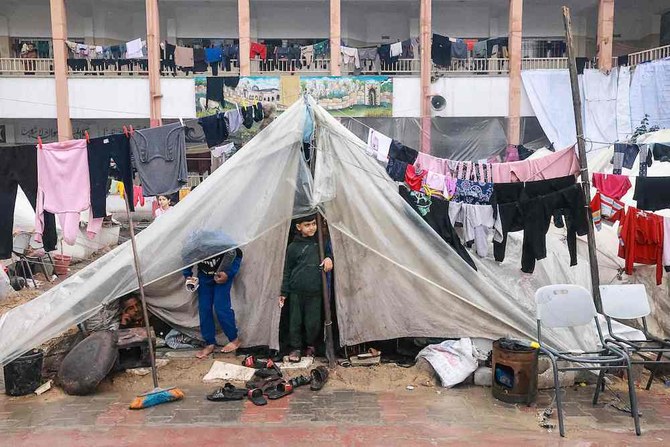Humanitarian operations at risk in an increasingly desperate world

https://arab.news/prct9
As the world prepares to say its goodbyes to 2023, it is not inappropriate to ask if we, as humans, are increasingly living in a more desperate state. In the last few weeks, “despair” has perhaps become the most-used word in the context of the Middle East. Unlike other places in the world, the region’s inhabitants have been exposed 24/7 as they follow the relentless bombardment, destruction, displacement and killing in Gaza, which has left its Palestinian population (most of whom are anti-Hamas) in the most desperate and desolate of conditions.
In fact, despair has been dominant in the vocabulary of the Arab Middle East for decades, even subconsciously, but increasingly this is spreading more widely, as the world observes conflict after conflict, from Sudan to Ukraine and from Syria to Afghanistan, Yemen and now Gaza. What makes the desperation even more pointed is the lack of international consensus on many crises and the fact that humanitarian needs have been surging as a result, while aid budgets have been shrinking.
And it is not very reassuring when the UN tells you that it needs $46.4 billion next year to bring lifesaving help to more than 180 million people in desperate circumstances around the world, but that it is not sure it will be able to collect such funds because the support on offer from the international community is not keeping pace with the demand.
The UN, in its “Global Humanitarian Overview” for 2024, painted an “incredibly bleak” outlook, claiming that conflicts, climate emergencies and collapsing economies have been “wreaking havoc” on the most vulnerable. Yet, what seemingly leads to greater despair is that, while global attention is focused on the conflict in the Gaza Strip, other places like Sudan and Afghanistan continue to need major international aid operations. This comes at a time when the size of the annual appeal and the number of people it aims to reach has been scaled back compared to 2023, following a decrease in donations.
Humanitarian organizations, such as the UN and other nongovernmental groups, fill in the gaps to save lives, fight hunger, offer shelter and sanitation, protect children and fight epidemics in many of the world’s most inhumane contexts. But the world’s increasingly conflictive, competitive and polarized geostrategic setting is making the work of international organizations more challenging than ever, while the needs are more desperate than ever. Meanwhile, there appears to be an absence of even the most basic multilateral work by the leading countries on the planet.
The UN’s 2023 appeal was for $56.7 billion, but the organization received just 35 percent of that amount — one of the worst funding shortfalls in years. As a result, the UN was only able to help 128 million people. This year’s appeal, according to the overview, intends to secure aid for 72 countries, 26 of which are states in crisis, while the other 46 are neighboring countries dealing with the knock-on effects, such as influxes of refugees. The five largest single-country appeals are for Syria ($4.4 billion), Ukraine ($3.1 billion), Afghanistan ($3 billion), Ethiopia ($2.9 billion) and Yemen ($2.8 billion).
There appears to be an absence of even the most basic multilateral work by the leading countries on the planet
Mohamed Chebaro
It Is estimated 300 million people will need assistance next year, down from 363 million the year before. But the UN will only try to reach 180 million of them, with other national and nongovernmental organizations hopefully providing for the remainder. Otherwise, it will simply be left for front-line countries and communities to provide the first help.
The Middle East and North Africa region alone will require $13.9 billion in 2024 — the largest total for any region — to cover the ramifications of Syria’s ongoing displacement, the Yemen war and lately Sudan and its neighbors, in addition to Gaza and the West Bank, of course.
The UN is not alone in this regard. The International Committee of the Red Cross will also cut its budget next year, by 13 percent, due to dwindling donations after key donors like the US reduced their funding. Like the UN, it is present in more than 90 countries and its activities range from providing basic humanitarian aid to visiting prisoners of war.
It is expected that 2023 will be the first year since 2010 in which humanitarian donations declined compared to the previous year. The UN has therefore scaled down its appeal to just $46.4 billion in the hope it can focus what it collects on helping to meet the gravest and most urgent needs.
One would hope that such humanitarian funding shortages will only be temporary. However, the desperation stems from the fact that a vacuum is increasingly being felt at the top, as leading nations have been confronting each other, taking ever more competitive hegemonic stances instead of searching for de-escalation and peace. In addition, there are domestic pressures due to the rise of the hard right and isolationist populism, especially in many democratic countries, which act as a disruptor instead of a contributor to helping defuse tensions and working toward peace and prosperity as a common goal.
In the last decade, the erosion of multilateralism has been unmistakable and maybe the world needs to go back to the drawing board to rejig the rules of cooperation and compromise. In its absence, one would hope that the world would not have gone down the route of losing the humanitarian umbrella that has for decades helped moderate the blows many innocents have suffered as a result of short-sighted policies, competition and greed, which have been part and parcel of human existence across the ages.
• Mohamed Chebaro is a British-Lebanese journalist with more than 25 years’ experience covering war, terrorism, defense, current affairs and diplomacy. He is also a media consultant and trainer.









































